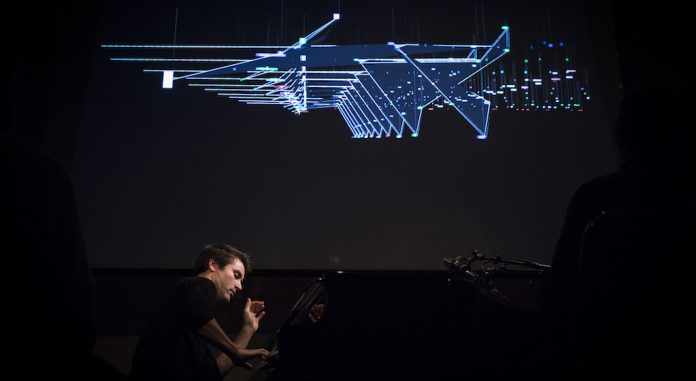As Natural Machines, his album from earlier in 2019, shows, Dan Tepfer produces music from a Yamaha Disklavier piano that’s both computerised and humane, informed by his background in physics and programming. The greatest music is a combination of the spiritual and the algorithmic, he’s argued: “Bach’s music, a lifelong inspiration…[is] at once heavily rule-based and guided by raw emotional truth”. In his onstage commentary at Kings Place, the pianist explained that “Everything I’m going to play is free improvisation”. As the album should indicate, that’s in a broad sense of “free” – there’s sometimes a swing groove, but no standards or jazz standards, and only a hint of blues.
Tepfer is probably best known as Lee Konitz’s partner for the last decade or more – they released their searching duet album Decade in 2018. In his new project, whether on the album or live, he’s always improvising. When Tepfer plays a chord or phrase, the piano responds in real time, the keys guided by algorithms that he’s programmed into his computer. In an online interview, he comments that “When I play and the algorithms respond, it feels more like I’m playing alongside an idea than a person… its reaction is always some kind of transformation of what I play”. But although the only sound we hear is the sound of an acoustic concert-grand piano, “it’s like playing a fundamentally new instrument”, says Tepfer.
Tepfer’s encore, a straight interpretation of Miles Davis’s Solar, maybe gave the game away – he’s a jazz pianist at heart
Further coding turns the data into abstract animated graphics that mirror the notes, and at Kings Place, the audience were provided with VR (Virtual Reality) headsets. Tepfer comments in his online interview that “None of the notes I’m going to play are known ahead of time, nor the computer’s response, and hence none of the visuals either – only the way these things work … the data needs to be sent to each audience member’s device right as I’m playing it at the piano”. He’s programmed the visuals so they’ll happen in a smartphone browser, and a powerful wifi router sends data to every audience member.
The strictly musical results are unlike most European free improvisation in that they’re often tonal or at least chromatic – but more radical in their technological and visual implications. On Intervals, Tepfer plays a note, and the Disklavier answers with an upward run; he layers more notes, and the responding patterns overlap and interlock. The rather lugubrious Fractal Tree is the first generative piece he wrote, some years ago. Looper, unsurprisingly, features loops and is a bit bluesy – here, as with some pieces, there are no visuals – and the results are artistically more complex than the looping often deployed by guitarists. But Tepfer’s encore, a straight interpretation of Miles Davis’s Solar, maybe gave the game away – he’s a jazz pianist at heart.
The album can be heard and seen on YouTube, though CD has the best sound.
Dan Tepfer. Kings Place, King’s Cross, 24 November 2019 as part of the 2019 EFG London Jazz Festival.
















